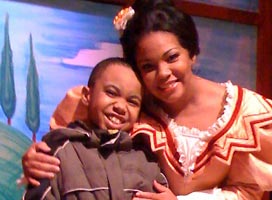

Venture Boldly

Office of Communications
2 East South Street
Galesburg, IL 61401

"We consider Chicago and 20,000 grade-school students to be part of our community," says Stephen Schroth, a faculty member in educational studies at Knox College in Galesburg. Schroth and colleague Jason Helfer are collaborating with Lyric Opera of Chicago on a unique educational program -- Opera in the Neighborhoods -- that is bringing in-depth information about opera to thousands of grade-school students and their teachers.
 Helfer and Schroth (left and right in top photo) wrote the text for the most recent issue of Backstage Pass! -- a magazine produced by Lyric Opera of Chicago for distribution to more than 24,000 Chicago students in grades three through eight.
Helfer and Schroth (left and right in top photo) wrote the text for the most recent issue of Backstage Pass! -- a magazine produced by Lyric Opera of Chicago for distribution to more than 24,000 Chicago students in grades three through eight.
"The magazine prepares students to see specially abbreviated performances of Gaetano Donizetti's The Elixir of Love at their schools," explains Helfer, who has bachelor's and master's degrees in music and a doctorate in education. Performances were held October 13 through November 13, 2009.
"Backstage Pass! is unique among opera companies -- it is a huge leap forward in making opera relevant and accessible for the general elementary-school student and teacher," says Mark Riggleman, director of education for Lyric Opera of Chicago. "Nothing quite like it exists in the field of opera education."
Schroth and Helfer developed a series of what they call guided investigations to connect opera with other content areas, including topics that are covered on state subject-area tests. "Stephen and I both have interests in the fine arts," Helfer says. Last year, they presented a research paper at the California Association for the Gifted on the use of guided investigations to teach both art and mathematics.
"Opera is a wonderful art form, because it incorporates music, visual art and theatre," says Schroth, who was recently selected as chair-elect of the Arts Network of the National Association for Gifted Children. "Opera provides so many pathways for children to become engaged with the subject, but it also requires an agile teacher. You need background knowledge of several disciplines. Our magazine provides teachers with the historical and theatrical background that is a starting place for exploration."
Set in an Italian village about 1800, The Elixir of Love is about a naive peasant who purchases a supposedly magic potion -- the "elixir" of the title -- from a traveling tonic salesman, in hopes of winning the love of a wealthy woman, who is also being courted by a soldier who appears in the village at the head of a regiment.
"We connect the character who sells the supposed love potion with the topic of medical quackery," Helfer says. In the magazine, Helfer and Schroth challenge students to study the popular appeal of "miracle" cures throughout history.
"The sergeant whose garrison arrives in town -- we connect that with subjects like mercenaries and local armies, and the history of the Italian Revolution," Helfer says. The Elixir of Love premiered in 1832, prior to the consolidation of a national government in Italy, when local militias were clashing with foreign armies.
The magazine also links the opera to other current topics such as organic farming, and how composers are inspired by stories from popular culture. The 14-page magazine for students is accompanied by a 40-page teacher's guide.
Opera is both relevant and interesting to young people, when it is engagingly presented, Helfer says. "Most curriculums that work with opera deal strictly with plot and characters and musical selections. We wanted to do something that's different, that speaks to the imagination.
"I've talked with students about how opera is an athletic skill -- soloists must be able to sing over a full orchestra without a microphone," Helfer says. "And I have found that children often like the dramatic or tragic operas, like Aida, more than the comedies. My six-year-old son loves Carmen. And Turandot -- with an 'ice princess' and people getting beheaded -- I've never met a kid who didn't love that."
Helfer, associate professor and chair of the educational studies department, joined the Knox faculty in 2006. He received a bachelor of music degree at Millikin University, a master of music degree at the University of Illinois-Urbana, and a doctorate in education from the University of Illinois-Urbana.
Schroth, assistant professor of educational studies, earned a bachelor's degree at Macalester College, a law degree at the University of Minnesota, a master's degree at Teachers College at Columbia University and a doctorate in education at the University of Virginia. He has taught at Knox since 2006.
Founded in 1837, Knox is a national liberal arts college in Galesburg, Illinois, with students from 47 states and 48 countries. Knox's "Old Main" is a National Historic Landmark and the only building remaining from the 1858 Lincoln-Douglas debates.
Published on November 17, 2009